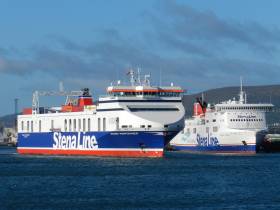Displaying items by tag: Acquisition DFDS in 2011
#TrafficGrowth - Two Irish Sea routes linking Belfast to English ports of Liverpool and Heysham operated by Stena Line have shown significant growth following their acquisition from DFDS five years ago.
Since the £40m purchase in 2011, Stena Line’s carryings on the routes have gone steadily increased with approximately 1.3m guests, 370,000 cars and 1.45m freight units making the trip across the Irish Sea.
Freight volumes on the two routes since Stena Line took them over have increased by 37%*, with passenger numbers rising by 14.5%* and car traffic growing by 8.4%* during the same period.
Investment in the routes has been significant with more than £9 million spent since 2011 across all aspects of the service, including cabin improvements, upgrades to the truckers lounge, the introduction of premium Stena Plus lounges and quiet rooms, and an overhaul of the ships’ existing bar and restaurant facilities to bring them into line with the rest of the Stena Line fleet.
In addition, they have added extra capacity and frequency via the introduction of a fifth ship serving Birkenhead and Heysham. In 2013, the company added extra freight tonnage to the Liverpool service in the form of the Stena Hibernia which provided an extra eight trips per week, increasing capacity by 30.8% and bringing the total number of weekly sailings to 34 across both routes.
* Statistics are based on most recent full year figures (2015) vs last full year figures prior to acquisition (2010).
























































